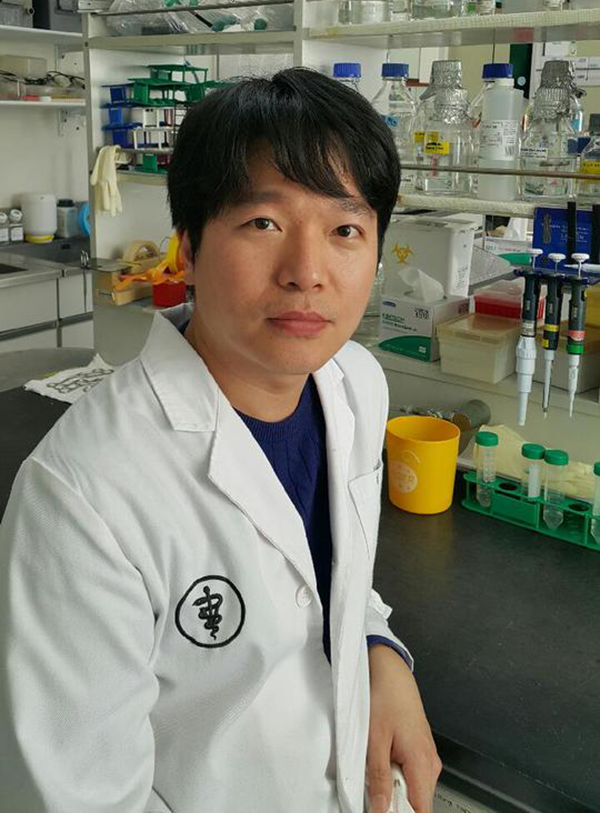Despite people’s show of aversion, Kim vows to be part of pioneer group
An Italian doctor and his team are about to perform one of the most talked-about surgeries -- technically and ethically -- in December.
In what will be the world’s first full-body transplant, Sergio Canavero and a multinational group of surgeons are to attach the body of a brain-dead donor to the head of a paralyzed patient to make the patient walk again.
The brave patient is a Russian computer scientist named Valery Spiridonov, who suffers from Werdnig-Hoffman disease, a muscle-wasting illness. His head would be frozen to stop brain cells from dying, and the spinal cord would be cut, repaired and fused onto the donor body.
Among Canavero’s operation team is Kim C-Yoon김시윤, a Korean veterinarian and research professor at Konkuk University건국대, who has helped his Italian colleague with his researches of laboratory animal medicine.
“My work proved that we could re-fuse the spinal cord if it is cut cleanly, with the aid of polyethylene glycol (PEG), a chemical adhesive that preserves nerve cell membranes.” Professor Kim said in a recent interview with Korea Biomedical Review.

Kim was the first person to reach out to Canavero in 2013 upon reading an article about the theory for a full-body transplant on the Internet. After contacting the Italian doctor through emails, Kim realized that Canavero had lacked in experience in animal experiments, but had in-depth knowledge on the subject and had the cooperative relationship in the U.S. and the EU. The two decided to pool their resources together.
Another scholar captured the interests of Kim and Canavero was Professor Ren Xiaoping in Harbin Medical University in China, who published two papers in 2014 after performing 1,000 head transplants on mice and a monkey. Canavero contacted him directly to make his research team complete.
“Professor Ren conducted head transplants on those animals by re-fusing blood vessels while I reconnected severely damaged spinal cords on mice and a dog. Both types of research were needed to accomplish the first human full-body transplant for project “HEAVEN’ (HEad Anastomosis VENture),” the Konkuk University professor said.
Asked about the reason the surgery process remains very slow, Kim cited financial problems accompanying this complex operation.
“Almost every country prohibits this controversial surgery process; therefore we are still trying to find a place to perform this surgery. Many people misunderstand that we are seeking money or fame from this operation, but that can hardly be further from the truth,” Kim said.
He pointed to a double-hand transplant in 2015 that took place in the U.S. to an 8-year old boy named Zion who suffered from sepsis. The surgery alone cost $60 million, required 50 doctors and took 11 hours to finish. The full-body transplant will cost $178 million, requires 150 doctors and will take approximately 36 hours.
In Kim’s opinion, the purpose of the first full-body transplantation will be a step closer to treating more spinal-cord injured patients into recovery from paralysis. But his studies are facing intense backlash, particularly from Korea Animal Rights Advocates (KARA) because of his animal experiments.
“I’m dismayed whenever the public focuses only on the ethical issues of the full-body transplantation. The main point is about helping paralyzed patients getting the chance to walk again,” Kim said. “Everyone has the desire to live longer and healthier.”
Kim cited the case of W Hospital in Daegu, which has successfully performed Korea’s first hand transplant recently. Thanks to the operation, Korea has become a country that can perform composite organ transplants, he noted.
Asked about similarities and dissimilarities between full-body transplant and hand transplant, Kim replied it’s almost identical. In fact, he eagerly tried to reach out to the doctors to share his research results. Well aware of the negative image surrounding Kim in his relationship with KARA, however, the doctors said they did not want to get involved in the controversy.
“It’s such a waste of resources. Korea has one of the best medical technologies in the world, yet no doctors or clinicians dare to be the first to defy the conventional morals of society,” Kim said.
Kim also expressed his wishes to follow the example of American and Russian cryonics companies Alchor and KrioRus to store bodies (or brains). These foreign firms use low-temperature preservation (at −196°C) in liquid nitrogen for people who cannot be sustained by contemporary medicine, with the hope that resuscitation and restoration to full health may be possible in the future.
Kim sent applications for grants but was rejected almost immediately. But the pioneering scientist says he won’t give up.
At the moment, Professor Kim is collaborating with Rice University in the U.S. to make the most of their top-class equipment with graphene and other bio-compatible materials. Controversial as Kim’s attempts are, not a few paralyzed patients might be wishing his perseverance would lead to another medical milestone soon.

